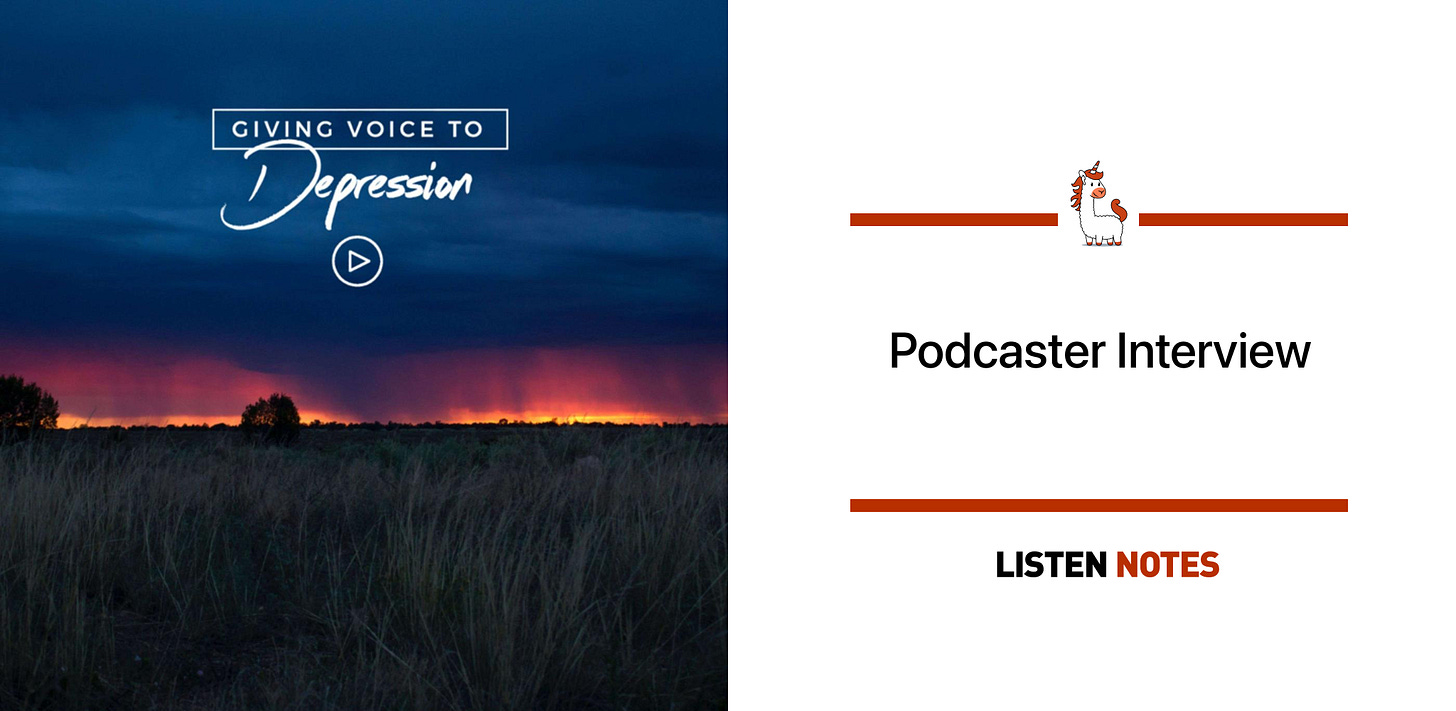Feature intimate conversations about lived experiences with depression and its management.
"...to chose a topic you are passionate about, so that even when it becomes a grind or you are having trouble finding guests, funding it, etc. you are driven to continue anyway."
Today Dr. Anita Sanz, the creator of Giving Voice to Depression shares her story of Mental Health podcast.
► Tell us about you and your podcast
The Giving Voice to Depression podcast was created to shine light on depression's darkness and to let people living with it know that they are neither broken, nor alone. Its co hosts are psychologist Dr. Anita Sanz, who has counseled clients with depression for decades and former journalist and crisis-line volunteer Terry McGuire, who has first-hand knowledge of the depth of depression's pit. Each week we interview a guest about their experience with depression (and often the co-occurring anxiety, manic episodes, etc.) to let listeners know that they're experiencing common symptoms vs. unique-to-them flaws/failures. Episodes are kept to about 20 minutes to respect often-limited attention spans related to depression.
► Why & how did you start this podcast?
Terry McGuire, a former broadcast journalist, Certified Peer Specialist and crisis-line volunteer started the podcast after her own worst-ever experience of depression. She realized that hearing from peers who had similar experiences would have helped her name and get treatment for the disorder much earlier, resulting in far less suffering. Given her interviewing background, she dedicated herself to creating what she'd needed. In the podcast's 8 years, its 400+ episodes have been downloaded nearly 3 million times. ListenNotes ranks the podcast in the top 1% globally.
Dr. Anita Sanz, a licensed clinical psychologist who has supported and counseled clients with depression for decades, shares her trademark compassion, perspective and advice each week.
Our first episode, released in February of 2017, was posted a few weeks after the idea came to Terry and her original co host, her sister Bridget, who also has depressive episodes.
► How'd you find the time and funding to do this podcast?
For the first 7 years, we produced and released new episodes weekly. Now we post two new and two re-released episodes monthly, since many new followers have not heard our earlier interviews.
Terry, who had been working as a freelance writer/on-camera/voiceover talent, found that work slowed dramatically during her depression. She says "I guess I looked and sounded like I felt, which made me virtually unemployable." She started the podcast with her own credit card. Months later she founded a non-profit and was able to get enough donations and grants to (usually) pay herself, her cohost, an audio engineer and social media manager to spread the guests' messages of hope. It was, to put it simply, a shoe-string budget that worked only because the team was passionate, dedicated, and willing to work even when payment was not possible.
► What do you gain from podcasting?
To a person, the Giving Voice to Depression production team "gains" fulfillment in knowing we are helping people who live with depression understand that there is hope. Without it, depression's messaging that we will always be in its darkness can become not only overwhelming, but dangerous. Everyone involved in our podcast and social media production has been personally affected by mental health disorders and suicide loss.
We also gain a sense of community with our guests and social media followers, and tips on how to protect and manage our own mental health.
Our first year (2017) we had 16k downloads. By 2022 we were nearing a million plays, and as 2024 ends, the count is more than 2.5M downloads.
After 8 years producing the podcast for a mental health non-profit, we have recently come under the umbrella of Recovery.com which funds the podcast and its team in full-- allowing us to focus solely on creating content vs. fundraising.
Listen411.com: Lightning-fast, Cost-effective Podcast Transcription and Summarization - Crafted with Passion by Listen Notes.
► How does your podcasting process look like?
We use Squadcast to interview our guest interviews and co host opening episode-specific introduction and post-interview discussion/analysis/takeaways. Terry, the producer, then uses Trint to transcribe the interview and to condense it to fit our 20-minute(ish) format. She uses SoundForge to edit the co host portions and to record voiceover transitions. An audio engineer, working with the audio files and script edits and sweetens the audio, adding our pre-recorded open/close and music.
► How do you market your show?
59% of our listeners use Apple Podcasts to play our podcast. I don't know where they originally learned of it. But we produce and post original social media content 12xs a week, including quotes and audio clips from the week's episode as both promotion and as a way of honoring our guests. We post on Facebook (where we have a community of 12k+ followers), IG, X, TikTok, and episodes on BlueSky and LinkedIn.
► What advice would you share with aspiring (new) podcasters?
I think the most helpful advice would be to choose a topic you are passionate about, so that even when it becomes a grind or you are having trouble finding guests, funding it, etc. you are driven to continue anyway.
► Where can we learn more about you & your podcasts?
https://givingvoicetodepression.com/
https://givingvoicetodepression.buzzsprout.com/2032100/episodes
https://www.linkedin.com/in/givingvoicetodepression/
https://www.facebook.com/GivingVoiceToDepression/
x.com/VoiceDepression
Listen411.com: Lightning-fast, Cost-effective Podcast Transcription and Summarization - Crafted with Passion by Listen Notes.
Lightning-fast: Transcribe a 1-hour audio file in 1 minute.
Pay-as-you-go: USD $0.06 per minute + $1 per file. No subscription required.


